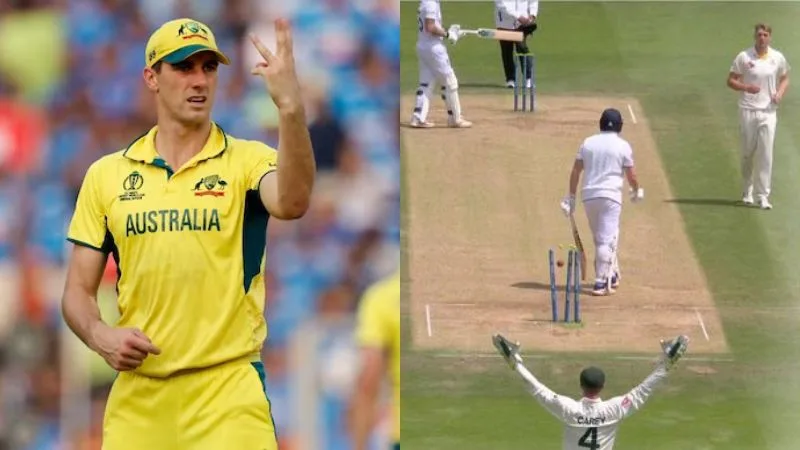Australian Captain Pat Cummins recently discussed his involvement in the contentious stumping of England’s Jonny Bairstow during the second Ashes Test last season. This incident, pivotal in altering the series trajectory, sparked England’s resurgence from a 0-2 deficit to ultimately draw the series 2-2. Cummins delved into his perspective on the incident, shedding light on its significance and the subsequent impact it had on both teams’ morale and determination. His insights provide a fresh understanding of the dynamics at play during this crucial moment in Ashes history.
The Mishap of Bairstow’s Stumping:
In the second Ashes test last July, Jonny Bairstow’s dismissal was a game-changer. Wicketkeeper Alex Carey stumped him for only 10 runs during England’s pursuit of a daunting 371-run target. Bairstow’s misstep occurred when he strayed from his crease, mistakenly assuming the ball was inert after evading it. Seizing the opportunity, Carey swiftly dislodged the bails, catching Bairstow off guard. This pivotal moment saw England’s hopes dashed, as they were eventually bowled out for 327 runs, cementing Australia’s 2-0 series lead.
The runout incident during the fourth day of the match sparked one of the Ashes series’ most significant controversies in recent memory. Following the contentious dismissal, the Australian team faced verbal abuse from Marylebone Cricket Club (MCC) members in Lord’s Stadium’s Long Room during the lunch break. Endless debates ensued regarding the ‘spirit of cricket,’ with numerous fans and experts expressing opinions on whether Bairstow should have been cautioned or the dismissal avoided altogether. Despite the uproar, the dismissal adhered to the legalities outlined in the laws of cricket.
Pat Cummins’s Reaction on This Incident:
In an upcoming segment of ‘The Test’ documentary set to premiere on May 24, Australian skipper Pat Cummins said, “Cam Green was bowling and bowled a bouncer and he [Bairstow] ducked underneath it and then just walked out of his crease. So I just said to Kez [Carey] the ball before, I said ‘Kez, just have a throw’.”
Reflecting on the moment, Cummins recounted his return to the Long Room after Bairstow’s dismissal. He recalled, “Walking back into the Long Room, it was like we’d ripped the soul of out them … absolutely, yeah, people stepped over the line.”
Other Australian Player’s Statement:
Australian player Usman Khawaja said, “One of them [the members] … [was] spraying me. I was like ‘nup, you can’t be saying that stuff’. He said ‘oh, I can say whatever I want’, like a sense of entitlement almost.”
Another player Marnus Labuschange said, “One of them was foaming at the mouth. A bloke hit Bull [David Warner] when he went up the stairs.”
Pondering the turn of events, Alex Carey reminisced about the atmosphere in the dressing room. Carey said, “Someone told me to throw it…not sure who it was.”
Mitchell Marsh remembered the dining room scene, and said, “I was sitting there like a school kid who shouldn’t be laughing…eating my soup, then I look up at Jonny and Jonny is staring over at us and I’m like [mimics trying not to spit out his soup].”
Despite calls for him to retract the appeal, Cummins stood firm, asserting there was no fault with the dismissal. In the documentary, he maintains his stance, unwavering in his belief regarding the legitimacy of the decision. He said, “Just clear-cut, it was out.”
England found renewed vigor following the charged-up run-out incident, mounting a formidable challenge against Australia. They clinched victories in the third and fifth Tests, showcasing their resilience. The series ended in a 2-2 draw, with England coming close to securing another win in the rain-affected fourth Test at Manchester. While Australia retained the Ashes urn, their inability to secure a series victory in England since 2001 underscored the intensity and competitiveness of the Ashes rivalry.
Alex Carey’s Statement:
After the Bairstow stumping incident, Carey faced substantial backlash from both spectators and social media platforms. The severity of online harassment prompted intervention from Australia’s cybersecurity authorities. The relentless barrage of abuse highlighted the intense scrutiny players endure in the digital age, underscoring the need for measures to address online harassment within the sporting community.
In the documentary, viewers witness Carey and his wife, Eloise, sharing insights into their experiences in the aftermath of the incident, shedding light on the challenges they faced in the days and weeks following the event. He says, “It got a little nasty there for a while. That’s probably the thing that shocked me the most, the abuse, people going after you…personal, family, all that sort of stuff.”
Following his performance dip post-Lord’s, Carey was omitted from the ODI squad early in the World Cup, a detail omitted from the documentary. As doubts loomed over his future during the home series against West Indies and Pakistan, Carey silenced critics with a resounding statement. His match-winning, unbeaten 98 against New Zealand in Christchurch quelled all skepticism surrounding his place in the team.
His fellow player Steve Smith said, “I could sense he wasn’t quite right mentally and I can understand it. I was worried about him and his well-being.”
Usman Khawaja further said, “Everyone projected on Kez and didn’t project on anyone else. It was all on Kez. Looking back on it, I just feel so bad for him what he went through at the time and what his family would have gone through being there at the time. It would have been so hard.”
Stay updated with all the cricketing action, follow Cricadium on WhatsApp, Facebook, Twitter, Telegram and Instagram













